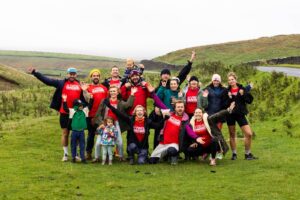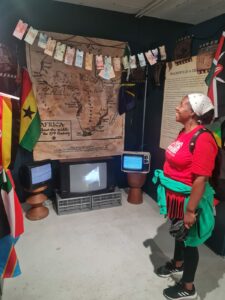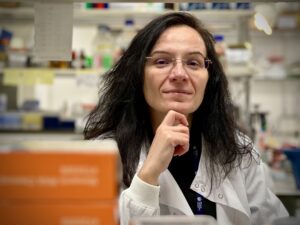Eleven walkers are taking on the Yorkshire Three Peaks challenge to support blood cancer research in memory of Graham Margot from Hertfordshire, who passed away in August 2022.
The group, made up of Graham’s wife, children, grandchildren and close family friends, are busy preparing for the endurance challenge on Saturday 7th October, whilst raising money for Leukaemia & Myeloma Research UK (LMRUK).
Graham’s daughter, Emily said: “The whole family wanted to do something to mark a year since dad’s passing, and after discussing different ways we could fundraise, we all decided on the Yorkshire Three Peaks challenge.
“In total, a group of 11 of us – made up of family and close friends – will be climbing the three peaks in different capacities to raise as much as we can for LMRUK to help fund vital research into more effective treatments.”
After experiencing severe stomach pains, and after much persuasion from his family, Graham went to his doctor and he was diagnosed with diverticulitis, a condition that affects the large intestine.
Further tests found that Graham had a high level of abnormal white blood cells, which prevented his bone marrow from producing new, healthy blood cells to help fight infections.
Graham was diagnosed with Chronic Myelomonocytic Leukaemia (CMML), which meant that his body struggled to fight off the infection caused by diverticulitis. He was admitted to the hospital in June 2022, where due to the infection, his bowel perforated and he developed sepsis, a life-threatening reaction. Graham sadly passed away in August 2022 surrounded by his family.
The Margot’s have set themselves the ambitious target of climbing all three peaks in 12 hours, starting at 7am and finishing the 24.5-mile trek at 7pm the same day.
Under the supervision of a professional guide, the round-trip route will start with Pen-y-Ghent Peak, followed by Whernside Peak and finishing with Ingleborough Peak, with a total ascent of 5,200ft. The hills form part of the Pennine Range and encircle the head of the valley of the River Ribble in the Yorkshire Dales National Park.
“My mum, Anna, and I previously completed the National Three Peaks Challenge, so this is a fantastic opportunity to explore more spectacular peaks, all for a good cause.
“We’ve had an overwhelmingly positive response from family and friends who all want to take part.
“Due to being pregnant, I’ll be unable to take part in the challenge, but I’ll be joined by the wives and fiancées of some of the walkers, with our very excited children, at the halfway point – Ribblehead Viaduct – where the group will be stopping for lunch. We’ll be making sure they’re well fed before spurring them on for the final leg of the challenge, where my sister, Sarah, will be joining them”, added Emily.
Completing the full challenge will be Anna, Graham’s wife, and Emily’s brother, Oli, brother-in-law, Sam, and husband, Alex, as well as close family friends; Charles, Jonny, Jamie, Julio, Emily, Robbo and Sharon.
Graham’s family now encourage people to get checked early if something doesn’t seem right.
“My dad never wanted to make a fuss, so ignored the warnings until his symptoms worsened. It was a very challenging time, with all of us taking turns to be by his side in the hospital. Sadly, he never recovered after his bowel perforated in combination with the blood cancer, but we continue to talk about him all the time, so our children know what an incredible man their grandfather was.
“After setting our fundraising target at £3,000, we can’t quite believe that we’ve now raised over £10,000 for LMRUK – it’s incredible!
“My dad would have hated all the fuss we’re doing in his memory, but we know he’s going to be looking down on us all feeling very proud”, said Emily.
To donate to the Margot’s Yorkshire Three Peaks challenge, visit their fundraising page here: www.justgiving.com/page/emily-margot-1693393054306.
Discover all the ways you can fundraise for our charity here: https://lmruk.org/fundraising/.
Update – A huge congratulations to everyone, they completed the challenge and have so far raised over £14,000. Well done!


Twelve members of the Kiwanis London South East Group took to the streets of London to complete an eight-mile fundraising walk for Leukaemia & Myeloma Research UK (LMRUK) raising over an impressive £1,600 for the charity.
The route started outside the Houses of Parliament and led them past iconic monuments linked to black history, including the statues of Martin Luther King and Nelson Mandela, and the first shop in London to be run by a former slave, Charles Ignatius Sancho, before finishing in Archbishops Park for a group picnic.

The Kiwanis is a worldwide foundation made up of enthusiastic volunteers committed to supporting children in poverty and vulnerable people.
Winston Mason, 61, helped to organise the circular walk in memory of his mother, Olive Campbell, who passed away aged 84 after being diagnosed with myeloma.
He explained: “In October 2019, my mother had a bad fall at home and was unable to get up, so my stepfather, Jocelyn, called me and we took her to the hospital to get her checked over. After doing blood tests, the results found that she had high levels of calcium in her blood, which led to her being diagnosed with myeloma.”
Olive passed away in February 2020, shortly followed by Jocelyn, who passed away the following month. Although Olive’s myeloma hadn’t turned aggressive, Winston said that after researching myeloma, his mother had been experiencing some of the common symptoms for a while before she was diagnosed, such as bone pain in her lower back and legs, which she mistook for sciatica.
To encourage his group to get on board, Winston said: “I shared my mother’s story with my local Kiwanis Group and asked if they’d help me fundraise for LMRUK. Everyone was really keen to get involved – it was fantastic!
“I learnt that others in the group had also been affected by blood cancer, so the thought of supporting research into more effective treatments to fight blood cancer spurred us on.”
The twelve walkers, aged between 20 to 67, rallied together and encouraged friends, family and colleagues to donate.

Winston is keen to raise awareness of the symptoms of myeloma to help others get diagnosed earlier; “We had a great response from passers-by who stopped us to ask who LMRUK is – after spotting our branded t-shirts – and why we were raising money for this charity. It started a lot of discussions which was a win for us!
“It was great to have everyone come together for a worthy cause, and we hope that the money raised will support vital research into finding a cure for blood cancer once and for all.”
Dr Joanna Tilley, Operations Director at LMRUK added: “Approximately 6,000 people are diagnosed with myeloma in the UK each year with people often mistaking the common symptoms such as bone pain, fatigue or recurring infections for something else.
“At LMRUK, we’re passionate about raising awareness of the signs and symptoms of the three main types of blood cancer, including myeloma, so people can get diagnosed earlier. The generous money that fundraisers like Winston raise supports our mission of funding vital research into more effective treatments for blood cancer using stem cell therapies so we can help to protect the next generation.
“A big thank you to Winston and the Kiwanis London South East Group for their fantastic efforts!”
Discover all the ways you can fundraise for our charity here: https://lmruk.org/fundraising/.
Grants worth a total of £57,500 have been awarded by the charity Leukaemia and Myeloma Research UK (LMRUK) for two projects that aim to help in the fight against blood cancers.
A record payout for LMRUK’s annual research grant, totalling £35,000, has been made to Dr Neil Rodrigues (pictured above), the principal investigator, and Professor Alex Tonks, co-investigator, at the European Cancer Stem Cell Research Institute at Cardiff University.
The money will help Dr Rodrigues continue his and Professor Tonks’ ground-breaking work into finding a more effective treatment for Acute Myeloid Leukaemia (AML) – a cancer of white blood cells that grow in the bone marrow. In the UK, approximately 2,000 people a year are diagnosed with the condition which, overall, has a poor prognosis.

LMRUK has also awarded a research grant of £22,500 to Dr Concetta Bubici, senior lecturer in the College of Health, Medicine and Life Sciences at the Brunel University of London, to continue her work investigating treatment for Myeloma by starving the disease of nutrients, specifically sugar and fat.
Dr Bubici said she was very grateful for the LMRUK grant which would allow her to further her studies on Myeloma and help identify the disease’s underlying causes, leading to more effective target drugs.
The Lister Wilder Research Grant awarded to Dr Bubici comes from money raised by Lister Wilder, a horticultural, agricultural and forestry machinery dealership with branches across the south of England. The money was raised by the company after one of their colleagues was diagnosed with blood cancer.
Dr Rodrigues said he was “honoured” to be the recipient of the award made directly by LMRUK for his work on AML in support of the research project titled: “Understanding ZEB1 mediated regulation of human Acute Myeloid Leukaemia (AML) to leverage novel therapeutics in poor prognosis AML.”
He said the project, which was initiated in 2016, showed a gene called ZEB1 was a ‘master switch’ capable of activating ‘flags’ on leukaemia cells. Those ‘flags’ are potential new therapeutic targets in AML.
Dr Rodrigues said: “We’ve identified one ‘flag’ that we are aiming at taking down, but we want to identify a wide range of different ‘flags’, focussing on subtypes of AML with the poorest prognosis.
“We know ZEB1 is also a useful tool to distinguish between relatively more and less aggressive forms of AML alike.” He said this will help “deconstruct the biological and clinical complexity observed in this disease.”
Dr Rodrigues said AML could be likened to weeds; since current treatments for AML don’t remove the ‘roots’ of the disease, the disease often returns, like weeds do when the roots have not been eradicated. Dr Rodrigues continued: “The aim of this research project is to find new therapeutics that will take aim at the ‘roots’ of AML which underpin therapy resistance and relapse.
“This is an important area of research for patients afflicted by AML where treatment strategies and prognosis have not advanced significantly for many decades. It is very difficult to speak to families who donate to our research about why AML prognosis has remained poor despite a tremendous research effort worldwide, but it is important to do so to explain the challenges in treating this disease and the hopes we have for the work we are doing.”
Dr Bubici, who received the Lister Wilder Research Grant, said she was investigating why treatments for Myeloma – which was treatable, but not curable – sometimes stopped working and why the various treatments sometimes failed to differentiate between malignant and healthy cells.
In her application for the research grant, she said: “What we know so far is that Myeloma cells are dependent on nutrients, such as sugar and fat. As a result, we propose to test whether starving Myeloma cells of nutrients could be used to treat Myeloma. This could quickly provide a new treatment option for people suffering from the disease worldwide.
“We have been studying master regulators of cell metabolism, which are present in malignant cells but not in healthy cells. We have found that blocking activities of these metabolic regulators or removing them from Myeloma cells makes them susceptible to death.
“This funding will enable us to continue conducting a series of laboratory investigations to see if depriving Myeloma cells of regulators of metabolism will restore the ability of current available drugs to treat Myeloma effectively. We will collaborate with clinicians and scientists from three haematological centres in London, Leeds, and St. Gallen in Switzerland.
“If successful, our work will lead to the testing of new drugs in combination with current anti-myeloma medications in the laboratory and, if deemed, in people. We hope that our work could rapidly lead to clinical trials of new drugs, which could give people with Myeloma a better chance of survival.”
For more information about the annual research grant, click here: https://lmruk.org/research/.